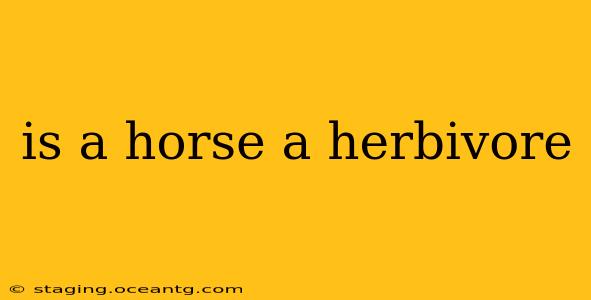Yes, a horse is definitively a herbivore. This means their diet consists entirely of plant matter. But understanding a horse's herbivorous nature goes far beyond simply stating what they eat; it delves into their digestive system, nutritional needs, and evolutionary adaptations. This comprehensive guide will explore the intricacies of equine herbivory, answering common questions and dispelling potential misconceptions.
What Defines a Herbivore?
Before we dive into the specifics of horses, let's establish a clear definition. A herbivore is an animal whose primary food source is plants. This includes various plant parts like leaves, stems, grasses, fruits, and roots. Herbivores possess specialized digestive systems adapted to efficiently break down tough plant fibers, a crucial element in their diet.
How Do Horses Digest Plant Matter?
Horses have a unique digestive system designed to handle large quantities of fibrous plant material. Their digestive tract is long and complex, featuring:
- A long cecum: This pouch-like structure houses microorganisms (bacteria and fungi) that ferment the cellulose in plant cell walls, releasing energy and nutrients that the horse can absorb. This process is crucial because horses cannot produce the necessary enzymes to break down cellulose on their own.
- A relatively small stomach: Compared to their overall body size, horses have a small stomach. This means they need to graze frequently to maintain a consistent supply of food.
- A large intestine: Further digestion and water absorption take place here.
This hindgut fermentation system is highly efficient at extracting nutrients from tough plant matter, but it also makes horses susceptible to digestive upsets if their diet changes too rapidly or if they consume something toxic.
What Do Horses Eat?
A horse's diet typically consists of:
- Grasses: The cornerstone of a horse's natural diet, offering essential fiber and nutrients.
- Hay: Dried grass, vital for providing fiber when pasture isn't available. Different types of hay offer varying nutritional profiles.
- Forage: This encompasses grasses, hay, and other plant materials that are high in fiber.
- Concentrates (in moderation): These include grains like oats, barley, and corn, which provide more readily available energy but should only be fed in moderation and with careful consideration of the horse's work level and individual needs. Too much concentrate can lead to digestive problems.
Understanding these dietary components is critical for ensuring a horse's overall health and well-being.
What are the Nutritional Needs of a Horse?
Horses have specific nutritional requirements that must be met to maintain their health, including:
- Fiber: Essential for digestive health and preventing colic.
- Protein: Needed for growth, muscle maintenance, and overall bodily functions.
- Minerals and Vitamins: Crucial for various bodily processes.
- Water: Abundant access to fresh, clean water is paramount.
Nutritional deficiencies can lead to serious health issues, underscoring the importance of a balanced and appropriate diet.
Are there any exceptions to horses being herbivores?
While horses are strictly herbivores, some horses might occasionally consume small amounts of non-plant material out of curiosity or if they experience a nutritional deficiency. However, this doesn't alter their fundamental classification as herbivores. Their digestive system is not adapted to process meat or other non-plant substances effectively.
Can Horses Eat Meat?
No, horses cannot digest meat effectively and should never be fed meat. Their digestive system is specifically designed for plant matter, and consuming meat can lead to digestive upset and other health problems.
What happens if a horse eats something it shouldn't?
Depending on what the horse consumed, the consequences can range from mild digestive upset to serious illness or even death. If you suspect your horse has ingested something potentially harmful, contact a veterinarian immediately.
Understanding that horses are herbivores is foundational to responsible horse ownership. Providing a balanced diet, rich in appropriate forages and appropriate supplements when needed, is essential for maintaining a horse’s health, vitality, and overall well-being.
